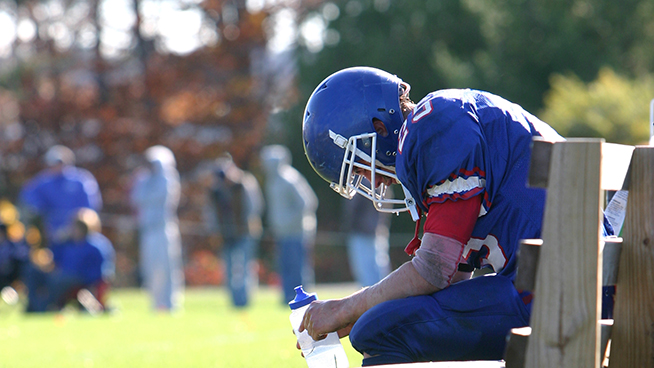GPA Must be This High to Play
Academic eligibility rules keep many kids from playing with their school sport’s team
February 23, 2018
The District 11 (D11) Athletic Handbook states that in order to be eligible to participate in athletics at any D11 high school, athletes must take a schedule of classes that amounts to five credits per semester, and that they can fail no more than one class per semester. Additionally, if a student wants to participate in a sporting event, they must attend a minimum of 50% of their classes on the day of the event. Individual schools are allowed to have higher standards for athletic eligibility, but no student is allowed to compete in interscholastic events until a signed permission form is on file with the district and the school, they pass and turn in a physical examination, and they have agreed to the rules and guidelines set by both the Colorado High School Activities Association (CHSAA) and D11. Therefore, every student knows exactly what they are agreeing to when they decide to participate in a school sport. Still, some of Coronado’s sports teams have been negatively affected by the academic eligibility rules.
Academic eligibility affects many of our sports teams, possibly most so Coronado’s football team. Assistant Coach Mr. Muth says that during football season, there were “kids who have been ineligible every single week. Especially with football, and as many kids as we had.” If kids are unable to compete, it can hurt the whole team in disastrous ways. “Kids that are really necessary to the success of the program, if those kids aren’t playing, the rest of the team suffers,” said Mr. Muth, giving the example that “individual sports would be kinda difficult. If you’re on the tennis team and you’re the number one single and now you’re not playing, I think that’s probably a pretty big impact. But I guess I could equate that to if our quarterback went down. If a star player or a kid we really depend on went down, that affects the entire football team.” “And especially with us, because we have a really small team this year, that tends to make a really big impact if any one kid is missing. If you have a hundred kids, and you have one or two replacements for every one of them, it’s not as big a deal. But with such a small squad, it’s really a big deal to have every kid eligible on the team.”
With the issue occurring so often, action is necessary to ensure that kids can play. Luckily for the football coaches, they found that “most of the time, the motivation of a kid not being able to play is enough [to encourage them to improve their grades].” When not being able to play did not adequately encourage athletes to improve their grades, the football team opted to have kids “run extra laps and do extra push-ups.” The biggest motivator to get grades back up, though, according to Muth, was “the fact that you don’t get to play with your teammates.”
Girls’ tennis is a sport with significantly fewer players and a reputation for being studious. Mr. Philipsen, the girls’ tennis coach this year, said that academic eligibility affects that team much less often. He said that in his three years of coaching Coronado tennis, he has never seen an issue arise with varsity tennis, but he has had some small issues with JV. Overall, however, “I’ve never had someone ineligible for a meet because of grades.” Mr. Philipsen takes a different approach to keeping kids motivated to stay on the team than Mr. Muth does. “As a teacher, I say that academics come first. In the past, when I’ve had those situations, girls and boys, whoever I’m coaching, tend to be on it. I will tell students ‘come to practice, and then you will sit there and do your homework during practice. And if you finish your homework, you can come join us for the practice,” he says about how he disciplines. Phillipsen’s logic is that “if you’re not eligible, you can’t play anyway, so why even practice until you get your grades up?” Both approaches work well and get student-athletes back to contributing to Coronado’s sports teams.
Mr. Muth summed up the difference between football and other sports well. In the end, it’s the same in every sport: if a “kid’s not eligible to play, it affects the entire program.”
Coronado sports and academics are two crucial parts of our school culture, and each impacts the other greatly. Whether you’re on a sports team or not, make sure your grades stay up and that you continue working hard!


